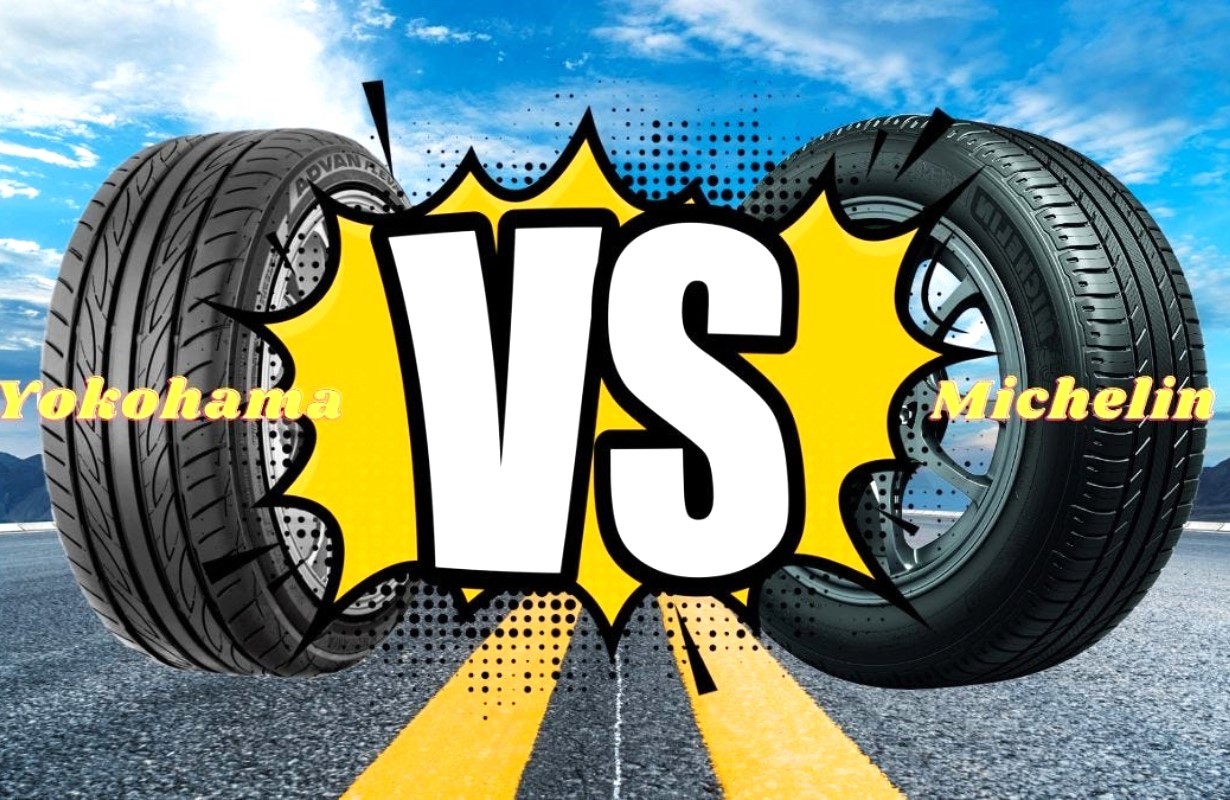Home>Automotive>Yokohama Vs. Michelin: The Ultimate Tire Showdown!


Automotive
Yokohama Vs. Michelin: The Ultimate Tire Showdown!
Published: January 16, 2024
Looking for the best tires for your automotive needs? Compare Yokohama and Michelin to find the ultimate choice for performance and reliability. Choose wisely for a smoother ride!
(Many of the links in this article redirect to a specific reviewed product. Your purchase of these products through affiliate links helps to generate commission for Noodls.com, at no extra cost. Learn more)
Table of Contents
Introduction
When it comes to ensuring the safety, performance, and longevity of your vehicle, the choice of tires plays a pivotal role. With a plethora of options available in the market, it can be overwhelming to select the perfect set of tires for your car. Among the many reputable tire brands, Yokohama and Michelin stand out as industry leaders, each with a rich history and a strong reputation for producing high-quality tires.
In this comprehensive guide, we will delve into the world of tires and explore the key differences and similarities between Yokohama and Michelin tires. By the end of this article, you will have gained valuable insights into these two renowned brands, empowering you to make an informed decision when it comes to equipping your vehicle with the best tires for your specific needs.
Whether you are a seasoned car enthusiast or a first-time tire buyer, understanding the nuances of tire performance, durability, and pricing is essential. By comparing Yokohama and Michelin tires side by side, we aim to provide you with a comprehensive understanding of the strengths and weaknesses of each brand, allowing you to make a well-informed choice that aligns with your driving preferences and budget.
So, buckle up and get ready for an exhilarating ride through the world of tires as we uncover the fascinating stories behind Yokohama and Michelin, dissect their performance and pricing, and explore firsthand customer experiences. It's time to embark on the ultimate tire showdown and discover which brand emerges as the champion in meeting your driving needs!
History of Yokohama Tires
Yokohama Rubber Company, Limited, the esteemed Japanese tire manufacturer, has a rich history that spans over a century. The company was founded in 1917 in the city of Yokohama, Japan, and has since evolved into a global powerhouse in the tire industry. Yokohama's journey began with the production of its first-ever commercial tire in 1917, marking the inception of a brand that would revolutionize the automotive world with its innovative tire technologies.
Throughout the decades, Yokohama Tires has continuously pushed the boundaries of tire engineering, focusing on delivering exceptional performance, safety, and durability. The brand's commitment to research and development has led to groundbreaking advancements in tire design, tread patterns, and rubber compounds, earning Yokohama a sterling reputation among drivers worldwide.
One of Yokohama's defining moments came in 1967 when it introduced the "Yokohama Grand Prix" radial tire, which was specifically designed for high-performance vehicles. This marked the brand's foray into the realm of high-performance tires, showcasing its dedication to catering to the evolving needs of automotive enthusiasts and professionals.
Yokohama's relentless pursuit of excellence propelled it to expand its global footprint, establishing manufacturing facilities and distribution networks in key markets across the globe. The brand's commitment to quality and innovation has resulted in a diverse product lineup, catering to a wide spectrum of vehicles, from passenger cars and SUVs to commercial trucks and racing vehicles.
In recent years, Yokohama has continued to make strides in sustainable tire manufacturing, emphasizing eco-friendly materials and production processes. This dedication to environmental responsibility aligns with the brand's overarching ethos of delivering not only exceptional performance but also contributing to a greener, more sustainable future.
With a legacy built on a century of tire manufacturing expertise, Yokohama Tires remains at the forefront of the industry, consistently setting new benchmarks for tire technology, safety, and performance. The brand's unwavering commitment to innovation and quality has solidified its position as a trusted choice for drivers seeking top-tier tires that excel in diverse driving conditions.
As we delve deeper into the comparison between Yokohama and Michelin tires, understanding the illustrious history and tire engineering prowess of Yokohama sets the stage for a comprehensive evaluation of its offerings and how they stack up against the competition.
History of Michelin Tires
The history of Michelin Tires is a captivating tale of innovation, perseverance, and a relentless pursuit of excellence that has cemented the brand's position as a global leader in the tire industry. The story begins in 1889 when brothers Édouard and André Michelin, visionaries and entrepreneurs, founded the Michelin Rubber Factory in Clermont-Ferrand, France. This marked the humble beginnings of a company that would revolutionize the automotive world with its pioneering tire technologies.
One of the pivotal moments in Michelin's history came in 1895 when the company introduced the world's first removable pneumatic tire, a groundbreaking invention that significantly enhanced the performance and comfort of vehicles. This innovation propelled Michelin to the forefront of tire manufacturing, setting a new standard for quality and ingenuity in the industry.
As the automotive landscape continued to evolve, Michelin remained at the vanguard of tire innovation, consistently raising the bar with its cutting-edge tire designs and engineering prowess. The brand's commitment to research and development led to the introduction of radial tire technology in 1946, a monumental advancement that revolutionized tire construction and performance, setting a new benchmark for safety, durability, and fuel efficiency.
Michelin's unwavering dedication to excellence extended beyond tire manufacturing, as the brand ventured into motorsports, where its tires achieved remarkable success in renowned racing events, further solidifying Michelin's reputation for producing high-performance, top-tier tires.
In addition to its technological advancements, Michelin has been a trailblazer in promoting road safety and providing valuable resources to drivers. The iconic Michelin Guide, first published in 1900, not only revolutionized the way travelers dined but also underscored the brand's commitment to enhancing the overall travel experience, reflecting its holistic approach to serving consumers beyond the realm of tire production.
Throughout its illustrious history, Michelin has expanded its global presence, establishing manufacturing facilities and distribution networks across continents, and diversifying its tire portfolio to cater to a wide array of vehicles, from passenger cars and motorcycles to commercial trucks and aircraft.
Michelin's ethos of innovation, quality, and sustainability has propelled the brand to the forefront of the tire industry, earning the trust and loyalty of drivers worldwide. With a legacy defined by a relentless pursuit of excellence, Michelin continues to set new benchmarks for tire performance, safety, and environmental responsibility, reaffirming its status as a premier choice for drivers seeking uncompromising quality and performance in their tires.
As we delve into the comparison between Yokohama and Michelin tires, understanding the storied legacy and tire engineering prowess of Michelin provides a comprehensive backdrop for evaluating its offerings and how they measure up against the competition.
Performance Comparison
When it comes to assessing the performance of tires, several crucial factors come into play, including handling, traction, durability, and overall driving experience. Both Yokohama and Michelin have solidified their positions as industry leaders by consistently delivering tires that excel in these key areas, albeit with distinct approaches and technologies.
Yokohama Tires, renowned for their innovative engineering and cutting-edge tire designs, have garnered acclaim for their exceptional performance across a wide range of driving conditions. The brand's high-performance tires, such as the ADVAN series, are engineered to provide superior grip, responsive handling, and precise cornering, making them a top choice for driving enthusiasts seeking an exhilarating and confidence-inspiring driving experience. Additionally, Yokohama's all-season tires, such as the AVID series, are lauded for their impressive traction on both wet and dry surfaces, delivering a balanced blend of performance and comfort for everyday driving.
On the other hand, Michelin Tires have carved a distinguished reputation for setting new benchmarks in tire performance and safety. The brand's commitment to innovation is evident in its range of tires, which are engineered to deliver exceptional handling, stability, and braking performance. Michelin's Pilot series, designed for high-performance vehicles, showcases the brand's expertise in crafting tires that offer precise steering response and optimal grip, enhancing the overall driving dynamics. Furthermore, Michelin's all-weather tires, such as the CrossClimate series, are engineered to deliver consistent performance in various weather conditions, ensuring reliable traction and braking responsiveness.
In terms of durability, both Yokohama and Michelin have invested heavily in tire technologies aimed at extending tread life and enhancing overall durability. Yokohama's proprietary tread compounds and tread designs are engineered to resist wear and provide long-lasting performance, offering drivers peace of mind and cost-effectiveness. Similarly, Michelin's tires are renowned for their longevity, with advanced tread compounds and tread patterns that prioritize durability without compromising performance, making them a compelling choice for drivers seeking enduring value from their tires.
When it comes to real-world performance, both Yokohama and Michelin have demonstrated their tire superiority through rigorous testing, earning accolades for their consistent performance, safety, and reliability across diverse driving scenarios. Whether navigating challenging road conditions, enjoying spirited drives, or simply commuting with confidence, the performance-driven engineering of Yokohama and Michelin tires shines through, reaffirming their status as premier choices for drivers who demand uncompromising performance from their tires.
As we delve deeper into the performance comparison between Yokohama and Michelin tires, it becomes evident that both brands have honed their tire technologies to deliver exceptional performance, catering to the diverse needs and driving preferences of discerning motorists. Whether seeking high-performance capabilities, all-weather versatility, or long-lasting durability, Yokohama and Michelin stand as paragons of tire excellence, each offering a compelling array of tires designed to elevate the driving experience to new heights.
Price Comparison
When considering the purchase of new tires, the price factor undoubtedly plays a pivotal role in the decision-making process. Both Yokohama and Michelin offer a diverse range of tires across various price points, catering to the budgetary preferences of a wide spectrum of drivers. Understanding the pricing dynamics of these esteemed tire brands is essential in making an informed choice that aligns with both your driving needs and financial considerations.
Yokohama Tires, renowned for their commitment to delivering exceptional value and performance, present a compelling array of tires that span different price categories. The brand's lineup encompasses budget-friendly options that provide reliable performance and durability without breaking the bank, making them an attractive choice for drivers seeking cost-effective yet high-quality tire solutions. Furthermore, Yokohama's mid-range and premium tire offerings, tailored to meet the demands of diverse driving styles and vehicle types, provide an optimal balance of performance, longevity, and affordability. This versatility in pricing ensures that Yokohama caters to the needs of budget-conscious drivers as well as those seeking top-tier tire technologies without compromising on value.
On the other hand, Michelin Tires, synonymous with uncompromising quality and innovation, present a pricing structure that reflects the brand's unwavering commitment to excellence. Michelin's tire portfolio encompasses a wide range of price points, offering options that cater to varying budgetary constraints while upholding the brand's renowned standards of performance, safety, and longevity. From budget-friendly tires that deliver reliable everyday performance to premium offerings that embody cutting-edge tire technologies, Michelin's pricing strategy ensures that drivers have access to an extensive selection of tires that align with their financial parameters without sacrificing quality.
It is important to note that while Yokohama and Michelin offer tires across different price ranges, the pricing of tires within each brand's portfolio is reflective of the advanced technologies, engineering expertise, and rigorous testing that goes into the development of their respective tire models. This underscores the notion that both brands prioritize delivering exceptional value to consumers, regardless of the price segment in which their tires are positioned.
Ultimately, the price comparison between Yokohama and Michelin tires underscores the brands' dedication to offering a wide spectrum of tire options that cater to the diverse budgetary preferences of drivers, ensuring that regardless of the price point, drivers can access tires that deliver uncompromising performance, safety, and longevity. By understanding the pricing dynamics of Yokohama and Michelin, drivers can make informed decisions that align with their financial considerations while reaping the benefits of world-class tire technologies.
Customer Reviews
Customer reviews serve as a valuable compass for navigating the vast terrain of tire options, offering firsthand insights into the real-world experiences of drivers who have entrusted their vehicles to Yokohama and Michelin tires. These candid testimonials provide a glimpse into the performance, durability, and overall satisfaction that drivers have derived from their tire choices, shedding light on the tangible impact of Yokohama and Michelin tires on their driving experiences.
Yokohama Tires has garnered a plethora of positive reviews from drivers across diverse driving scenarios. Customers have lauded Yokohama tires for their exceptional grip, responsive handling, and confidence-inspiring performance in both dry and wet conditions. Many drivers have expressed satisfaction with the longevity of Yokohama tires, noting that the tread wear has been minimal even after extensive use, underscoring the brand's commitment to durability. Additionally, customers have praised Yokohama for offering a diverse range of tire options that cater to specific driving needs, from high-performance driving to everyday commuting, ensuring that drivers can find the perfect tire match for their vehicles.
In the realm of Michelin Tires, customer reviews echo a resounding sentiment of trust and satisfaction. Drivers have commended Michelin tires for their exceptional traction, stability, and braking performance, emphasizing the sense of security and control they experience on various road surfaces. Many customers have lauded Michelin for delivering tires that excel in all-weather conditions, providing peace of mind and reliability during inclement weather. Furthermore, drivers have highlighted the longevity of Michelin tires, noting that the tread life surpasses their expectations, translating into long-term value and performance.
While both Yokohama and Michelin have amassed a wealth of positive customer reviews, it is important to acknowledge that individual driving preferences and vehicle dynamics can influence the subjective experiences of drivers. However, the consistent thread of satisfaction and acclaim woven through customer reviews underscores the unwavering commitment of Yokohama and Michelin to delivering tires that exceed the expectations of drivers, catering to their diverse needs and elevating their driving experiences.
As we delve into the realm of customer reviews, it becomes evident that both Yokohama and Michelin have garnered the trust and loyalty of drivers worldwide, with their tires consistently earning accolades for their performance, durability, and overall value. These testimonials provide a compelling testament to the tangible impact that Yokohama and Michelin tires have had on the driving experiences of customers, reaffirming the brands' positions as paragons of tire excellence.
Conclusion
In the ultimate tire showdown between Yokohama and Michelin, one thing becomes abundantly clear: both brands have solidified their positions as industry leaders, each with a rich legacy, unwavering commitment to innovation, and a relentless pursuit of excellence. The comparison between Yokohama and Michelin tires has unveiled a tapestry of tire engineering prowess, performance-driven technologies, and a dedication to meeting the diverse needs of drivers worldwide.
Yokohama Tires, with its century-long legacy of tire manufacturing expertise, has consistently pushed the boundaries of innovation, delivering exceptional performance, safety, and longevity across its diverse tire lineup. The brand's high-performance tires, such as the ADVAN series, have earned acclaim for their superior grip and precise handling, catering to the discerning needs of driving enthusiasts. Furthermore, Yokohama's dedication to sustainable tire manufacturing underscores its commitment to environmental responsibility, aligning with the evolving ethos of eco-conscious driving.
On the other hand, Michelin Tires, with its storied history of tire innovation, has set new benchmarks for tire performance, safety, and longevity. The brand's relentless pursuit of excellence is evident in its range of tires, engineered to deliver exceptional handling, stability, and all-weather versatility. Michelin's legacy of pioneering radial tire technology and its unwavering commitment to road safety have positioned it as a trusted choice for drivers seeking uncompromising quality and performance in their tires.
As drivers navigate the labyrinth of tire options, the performance, pricing, and customer reviews of Yokohama and Michelin tires underscore the brands' dedication to offering a diverse array of tire solutions that cater to varying driving preferences and budgetary considerations. Whether seeking high-performance capabilities, all-weather reliability, or enduring value, drivers can find a compelling tire match within the extensive portfolios of Yokohama and Michelin.
In the end, the ultimate tire showdown between Yokohama and Michelin transcends a mere comparison of brands; it embodies a celebration of tire engineering ingenuity, a testament to the tireless pursuit of excellence, and a reaffirmation of the pivotal role that tires play in enhancing the driving experience. Whether embarking on exhilarating journeys, navigating challenging road conditions, or simply commuting with peace of mind, Yokohama and Michelin stand as beacons of tire excellence, each offering a compelling narrative of performance, safety, and innovation.
As drivers embark on the quest for the perfect set of tires, armed with the insights gleaned from this comprehensive comparison, they are empowered to make informed decisions that align with their driving needs, preferences, and budgetary considerations. Whether opting for the cutting-edge technologies of Yokohama or the uncompromising quality of Michelin, drivers can rest assured that they are equipping their vehicles with tires that embody the pinnacle of tire engineering, setting the stage for exceptional driving experiences and countless miles of confidence-inspiring journeys.














